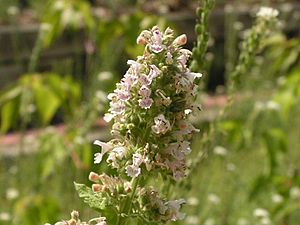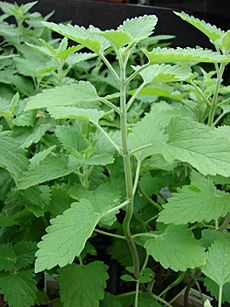Catnip facts for kids
Quick facts for kids Catnip |
|
|---|---|
 |
|
| Flowers of the plant | |
| Scientific classification |
|
| Kingdom: | Plantae |
| Clade: | Tracheophytes |
| Clade: | Angiosperms |
| Clade: | Eudicots |
| Clade: | Asterids |
| Order: | Lamiales |
| Family: | Lamiaceae |
| Genus: | Nepeta |
| Species: |
N. cataria
|
| Binomial name | |
| Nepeta cataria |
|
| Script error: The function "autoWithCaption" does not exist. | |
Script error: No such module "Check for conflicting parameters".
Nepeta cataria, often called catnip or catmint, is a special plant that belongs to the Nepeta group. It's part of the Lamiaceae family, which also includes mint. The name "catmint" is sometimes used for the whole group of Nepeta plants. This plant is famous because of its interesting effects on cats!
Contents
Why Cats Love Catnip
Catnip is well-known for how it makes cats act. When cats smell or play with catnip, they might rub against it, roll on the ground, or even chew on it. Some cats purr loudly or cry out. This playful behavior usually lasts for about five to fifteen minutes. After that, cats often get tired of the smell for a while.
How Catnip Affects Cats
Catnip contains a special chemical called nepetalactone. When this chemical enters a cat's nose, it acts like a magnet for their senses. It connects with tiny parts inside the cat's nose called olfactory receptors. These receptors then send signals to the cat's brain, causing the fun reactions you see.
Which Cats Are Affected?
The catnip effect works on many different types of cats, not just our pet domestic cats. Big cats like leopards, cougars, servals, and lynxes often react strongly to catnip. They act in ways similar to smaller cats. Even Lions and tigers might react, though not always.
For pet cats, N. cataria is like a fun toy. You can find catnip and products with catnip in stores. However, not all cats are affected by catnip. About one out of three cats doesn't react to it at all. Whether a cat reacts to catnip is something they inherit from their parents.
Other Plants Like Catnip
Some other plants can also have a similar effect on cats. One example is valerian (Valeriana officinalis).
Images for kids
See also
 In Spanish: Gatera para niños
In Spanish: Gatera para niños



